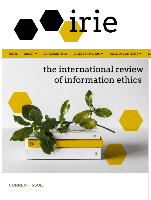
International Review of Information Ethics
Scope & Guideline
Pioneering Ethical Insights for a Technologically Driven World
Introduction
Aims and Scopes
- Information Ethics in the Digital Age:
The journal focuses on the ethical implications of information technologies, particularly regarding artificial intelligence, misinformation, and digital communication. It examines how these technologies affect society, individual rights, and ethical standards. - Disinformation and Misinformation:
A core area of research is the study of disinformation, misinformation, and their impact on public discourse. This includes analyses of social media dynamics, trust in media, and strategies for combating false information. - Critical Information Literacy:
The journal emphasizes the importance of critical information literacy in navigating the digital landscape, promoting education and awareness about information credibility and ethical consumption of media. - Ethics of Emerging Technologies:
Research often delves into the ethical considerations surrounding emerging technologies, including artificial intelligence, machine learning, and their societal implications. - Cultural and Social Dimensions of Information:
The journal also explores the cultural and social aspects of information ethics, including issues of access, equity, and the role of information in fostering social justice.
Trending and Emerging
- Impact of Artificial Intelligence:
There is a growing emphasis on the ethical implications of artificial intelligence, including its role in education, media, and social interactions. This trend reflects a broader societal concern regarding AI's influence on human rights and ethical governance. - Disinformation Strategies and Solutions:
Recent publications have increasingly addressed the complex nature of disinformation, particularly in digital environments. This includes studies on the effectiveness of fact-checking tools and the role of social media in shaping public perception. - Youth and Digital Communication:
Research focusing on the impact of digital communication on youth, including issues like hate speech and online behavior, is emerging as a critical area of concern, highlighting the need for ethical frameworks in youth engagement. - Interdisciplinary Approaches to Information Ethics:
An emerging trend is the integration of interdisciplinary methods to tackle information ethics, drawing from psychology, sociology, and technology studies to provide comprehensive analyses of ethical dilemmas. - Global Perspectives on Information Equity:
There is a rising interest in addressing global disparities in access to information and technology, emphasizing the importance of equity and social justice in the digital age.
Declining or Waning
- Traditional Media Ethics:
Research centered exclusively on traditional media ethics has become less frequent, as the focus shifts towards digital media and the unique ethical challenges posed by social platforms. - General Theoretical Frameworks:
There has been a decline in papers that discuss broad theoretical frameworks of information ethics without specific application to current technologies or social issues, as the journal increasingly emphasizes practical implications. - Focus on Localized Issues:
There has been a noticeable reduction in papers that address localized information ethics issues without a broader context or connection to global trends, reflecting a shift towards more universal themes.
Similar Journals
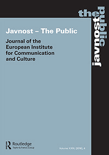
JAVNOST-THE PUBLIC
Illuminating the Nuances of CommunicationJAVNOST - THE PUBLIC is a prestigious academic journal that has established itself as a leading platform within the field of communication. Published by Routledge Journals, Taylor & Francis Ltd in the United Kingdom, this journal caters to researchers, professionals, and students interested in the multifaceted dynamics of public communication and societal engagement. With an impressive Q1 ranking in the Communication category as of 2023 and a Scopus ranking of #166/511, placing it in the 67th percentile, it is widely recognized for its rigorous research contributions and theoretical insights. The journal has been in continuous circulation since its inception in 1994, and it actively seeks to publish high-quality, empirical studies that explore the nuances of public discourse, media influence, and societal interactions. Though a traditional publication, JAVNOST - THE PUBLIC remains committed to advancing the field by offering valuable resources and knowledge crucial for addressing contemporary challenges in public communication.

DESIDOC Journal of Library & Information Technology
Advancing Knowledge in Library and Information TechnologyDESIDOC Journal of Library & Information Technology, published by the Defence Scientific Information Documentation Centre, is a pivotal scholarly platform in the realm of Library and Information Sciences. The journal, indexed with ISSN 0974-0643 and E-ISSN 0976-4658, has established its reputation with a commendable Q3 category ranking in the latest Scopus quartiles and a notable rank of 113 out of 280 in its field, placing it in the 59th percentile. Engaging a global audience, it disseminates high-quality research insights aimed at advancing the practices and technologies within library and information management. Operating within a converged timeframe from 2012 to 2024, the journal is committed to fostering robust discussions surrounding contemporary issues in the field, making it an invaluable resource for researchers, professionals, and students alike. While currently not offering open access, its content is accessible through institutional subscriptions, reinforcing its significance in the academic community of India and beyond.
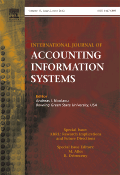
International Journal of Accounting Information Systems
Unveiling New Horizons in Accounting Information TechnologiesInternational Journal of Accounting Information Systems, published by Elsevier, is a premier academic platform dedicated to advancing scholarship in the intersecting fields of accounting, finance, and information systems. With a robust impact factor reflective of its standing, this journal has maintained a Q1 ranking across multiple categories as of 2023, including Accounting, Finance, and Management Information Systems. By disseminating high-quality research, the journal serves as an essential resource for academics, practitioners, and students who seek to deepen their understanding of innovative accounting practices and information system technologies. Established in 2000, the journal consistently showcases cutting-edge research and case studies that resonate with contemporary challenges in the business environment. Subscribers can benefit from a wealth of knowledge that informs both theory and practice, furthering the development of effective accounting information systems and strategic management decisions.
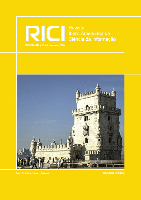
Revista Ibero-Americana de Ciencia da Informacao
Transforming Challenges into Opportunities in Information ScienceRevista Ibero-Americana de Ciencia da Informacao is a prominent open-access journal dedicated to advancing the field of information science within the Ibero-American context. Published by the University of Brasilia's Department of Information Science, this journal has been a vital resource for researchers, professionals, and students since its inception in 2008. With an ISSN of 1983-5213 and an E-ISSN of 1983-5213, it provides a platform for the dissemination of innovative research and practice in library and information sciences. The journal's commitment to open access ensures that its rich content is readily available to a global audience, promoting collaboration and knowledge-sharing among scholars. Despite its early-stage Scopus ranking of 234 out of 280 in the Social Sciences category, it serves as a crucial conduit for tackling contemporary challenges in the field, particularly as it embarks on the converged publication years from 2020 to 2024. By striving for inclusivity and relevance, the Revista Ibero-Americana de Ciencia da Informacao aims to foster innovation and enhance the quality of information science scholarship across Ibero-America and beyond.
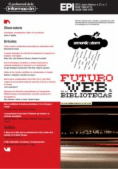
Profesional de la Informacion
Transforming the Landscape of Academic DiscourseProfesional de la Informacion is a leading academic journal dedicated to advancing research in the fields of Communication, Cultural Studies, Information Systems, and Library and Information Sciences. Published by EDICIONES PROFESIONALES INFORMACION SL-EPI, this journal has established itself as a pivotal resource for scholars and practitioners alike since its inception in 2006, holding an impressive Q1 ranking across its categories in 2023. With an impactful presence reflected in its Scopus Rankings—33rd out of 511 in Communication and 26th out of 280 in Library and Information Sciences—Profesional de la Informacion provides a forum for innovative research and discussion. Although it operates under a subscription model, the journal’s commitment to quality research contributes significantly to the knowledge base within its fields, making it an essential read for those who are passionate about information and communication studies. Positioned in the vibrant academic landscape of Barcelona, Spain, this journal encourages submissions that explore contemporary challenges and advancements in these vital areas of study, solidifying its role as a cornerstone of scholarly discourse.
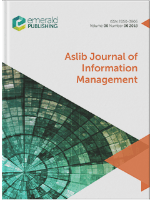
Aslib Journal of Information Management
Empowering Research, Shaping the Future of Information SciencesThe Aslib Journal of Information Management, published by Emerald Group Publishing Ltd, stands as a vital resource within the field of library and information sciences, enjoying a prominent position in the academic landscape with an impressive 2023 impact factor. This journal embraces a wide-ranging scope that encompasses innovative research, practical applications, and theoretical advancements in information management. Reflecting its exceptional quality, it has achieved a Q2 ranking in Information Systems and a distinguished Q1 ranking in Library and Information Sciences as of 2023. With its Scopus rankings placing it in the 83rd percentile for Library and Information Sciences, the journal is a leading platform for both scholars and practitioners seeking to advance knowledge in the discipline. The journal is committed to open access, fostering greater visibility and accessibility of research outputs. As it converges on its tenth anniversary (2014-2024), the Aslib Journal of Information Management continues to be an essential tool for researchers, professionals, and students eager to navigate the rapidly evolving landscape of information management.

AtoZ-Novas Praticas em Informacao e Conhecimento
Cultivating open access to pioneering research and practices.AtoZ-Novas Praticas em Informacao e Conhecimento is a pioneering open-access journal dedicated to advancing knowledge in the fields of Information Science, Library Science, and Management Strategies. Published by the esteemed Universidade Federal do Paraná, this journal serves as a critical platform for researchers, professionals, and students to share innovative practices and insights pertinent to the evolving landscape of information management. Launched in 2011, it has rapidly gained recognition, holding a Q4 rank in Information Systems and a Q3 rank in Library and Information Sciences as of 2023. While it currently occupies lower percentiles in various Scopus categories, the journal is passionate about driving the discourse in these domains, especially within the Brazilian context. With its commitment to open-access publishing, the journal not only aims to disseminate knowledge widely but also encourages collaboration among scholars and practitioners, making it an invaluable resource for those seeking to enhance their understanding and application of information practices.
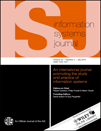
INFORMATION SYSTEMS JOURNAL
Bridging Knowledge and Application in the Evolving Digital LandscapeINFORMATION SYSTEMS JOURNAL, published by Wiley, is a prestigious academic journal dedicated to advancing the field of information systems, encompassing key areas such as computer networks, communication technologies, and software engineering. With an impressive track record of more than three decades, since its inception in 1991, the journal has secured a prominent position reflected in its Q1 rankings across multiple categories in 2023, placing it among the top-tier journals in Computer Networks and Communications, Information Systems, and Software. It boasts outstanding Scopus ranks, with percentiles in the 90s, positioning it as a vital source of cutting-edge research for professionals, academics, and students aiming to enhance their knowledge and contribute to the evolving landscape of information technology. Although it does not currently offer open access, the journal welcomes contributions that bridge theoretical insights with practical applications, fostering a dialogue among researchers and practitioners in the fast-paced world of information systems.
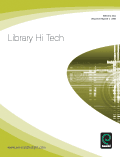
LIBRARY HI TECH
Empowering Innovation in Information SystemsLIBRARY HI TECH is a distinguished peer-reviewed journal published by Emerald Group Publishing Ltd, offering a vital platform for researchers, professionals, and students in the fields of Library and Information Sciences and Information Systems. Since its inception in 1983, this journal has been instrumental in disseminating cutting-edge research and innovative practices, boasting an impressive Q1 ranking in Library and Information Sciences and a Q2 ranking in Information Systems as of 2023. Recognized globally for its robust scholarship, LIBRARY HI TECH holds significant positions in Scopus, ranking #22 out of 280 in Library and Information Sciences, placing it in the top 92nd percentile, and ranking #77 out of 394 in Computer Science — Information Systems, with an admirable 80th percentile. This journal not only enriches the academic dialogue but also contributes to the practical evolution of library technologies and information management, making it an essential resource for those keen on advancing their knowledge in these dynamic fields. With no open access, access is typically gained through institutional subscriptions or direct purchase, ensuring high-quality dissemination of research findings.

Revista Comunicacao Midiatica
Exploring the Dynamics of Media and CultureRevista Comunicação Midiática is a prominent academic journal focusing on the fields of communication, media studies, and cultural dynamics, published by Universidade Estadual Paulista Júlio Mesquita Filho, Facility of Architecture, Arts & Communication. With its ISSN 2236-8000, this journal aims to disseminate innovative research, theoretical advancements, and practical insights that contribute to a deeper understanding of communication processes in contemporary society. Although it currently does not provide Open Access options, the journal serves as a valuable resource for researchers, professionals, and students who are keen to explore the intricate relationships between media and culture. Located in Bauru, Brazil, the journal is committed to fostering multidisciplinary dialogue and enhancing scholarly discourse, making it an invaluable addition to the academic landscape in the realm of media studies.